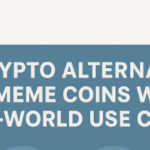In this article, I will discuss Do Crypto Coins Expire and explore whether digital currencies like Bitcoin or Ethereum have a lifespan.
While most cryptocurrencies are designed to exist indefinitely, some blockchain-based tokens can be programmed to expire or self-destruct. Understanding these differences is essential for anyone navigating the evolving world of crypto assets and smart contract functionality.
What is Crypto Coins?
Digital crypto coins can be described as currency that are based through decentralized blockchain networks that allow secure peer-to-peer transactions without intermediaries such as banks. In contrast to tokens, which are constructed on blockchains that exist Coins such as Bitcoin and Ethereum have their own distinct blockchains.

They are used as a method of exchange as well as storage of value as well as, in some instances fuel for applications that are decentralized. Cryptocurrencies employ cryptographic methods for security. They are generally gained by mining, staking or through direct purchase from cryptocurrency exchanges.
Do Crypto Coins Expire

Here are the key elements to consider when addressing this issue:
No expiry by default
The majority of the major cryptocurrency coins such as Bitcoin, Ethereum, and Litecoin do not expire. They are valid for until the blockchain is in existence.
Storage Value Is a permanent:
for as long as people securely store their keys or access to their wallets, coins remain available.
There is no built-in lifespan
Coins stored that are on blockchains of their own cannot be programed to stop working or expire after a specific date.
Exclusivity via Smart Contracts
Some tokens (not coins) developed on platforms like Ethereum could be programed to expire by using smart contracts.
Differentiation Between Tokens and Coins
Coins are typically used as the native currency of blockchains, whereas tokens might have rules that are specific to them such as expiry.
Self-Destructing Features Exist
While they are rare in coins, a few smart contracts utilize self-destruct mechanisms to make tokens that are temporary.
Use Cases and Benefits
Subscription models: Tokens with expiration dates allow access for a short period to content, services as well as platforms (e.g. streaming services, SaaS and DeFi instruments).
Limited-Time Governance Rights:The tokens that expire are a way to grant voting rights only for specific time periods of governance, which increases the fairness and accountability of governance.
Airdrops and promotions :The tokens that are time-limited create an urgency that encourages more engagement in promotional campaigns or loyalty programs.
Access Control :Self-destructing tokens may control access timed to digital events, digital resources or content. They are suitable for rental and digital access passes.
Security: Tokens that expire automatically minimize the risk of hacks or data leaks since they are able to be used after a certain period of time.
Supply Management: The ability to burn or expire tokens are used to manage the supply of tokens and inflation and support economic models that are deflationary.
The DeFi as well as the Lending: Decentralized financing, the time sensitive tokens may limit loan durations, or even represent mature financial instruments.
Risks and Challenges
User Confused
Users might not understand how the token may expire or self-destruct, which can lead to sudden loss of access or funds.
Smart Contract Issues
Poorly written contracts could make tokens expire too early or fail to perform the expiration in a timely manner and cause the system failing or causing financial loss.
loss of value
Tokens expiring could lose value rapidly when the expiration date is near which could reduce demand and decrease liquidity.
Regulative Uncertainty
Time-sensitive or destructible tokens can raise compliance issues in countries that have strict consumer or financial protection laws.
Reversibility
When a token expires, or self-destructs, it’s forever–there is no recovery option unless explicitly created.
limited Ecosystem support
Some wallets and exchanges do not natively allow expiration logic. This causes issues with compatibility and usability.
Complexity for developers
Making and maintaining such tokens is a complex process that requires smart contract programming, which increases the cost of development and exposing you to the possibility of risk.
The Future of Time-Limited Tokens
With the increasing popularity of programmable assets, time-limited tokens are expected to play an increasingly significant role in the development of blockchain technology. Token expiration is being investigated more and more by developers for use in temporary access rights, decentralized identity, subscriptions, and regulatory compliance. More sophisticated expiration logic may be supported by emerging standards like Ethereum’s ERC-1155 and ERC-3643.
Future applications where temporary ownership or usage rights are essential, like DeFi, gaming, and the metaverse, might see broader adoption. Time-limited tokens may become crucial tools for controlling automation, scarcity, and access control as smart contracts advance in sophistication and usability. This would raise the bar for safe and adaptable token design and open up new business opportunities across various industries.
Pros & Cons
| Pros | Cons |
|---|---|
| Enables time-based access control | Can confuse users unfamiliar with expiration logic |
| Useful for subscriptions, events, and promotions | Irrecoverable once expired or destroyed |
| Enhances security by limiting token lifespan | Smart contract bugs may lead to premature expiration |
| Reduces token oversupply and inflation | Limited support across wallets and exchanges |
| Supports automation in DeFi and governance systems | Lower perceived value near expiration |
| Encourages urgency and participation in campaigns | Legal and regulatory complexities in some jurisdictions |
| Can simulate real-world time-limited assets | Requires advanced coding and testing |
Conclusion
Cryptocurrency coins typically never expire. As long as the user has access to their private keys, popular cryptocurrencies like Bitcoin, Ethereum, and others are made to last forever on their respective blockchains. But as smart contracts have developed, some tokens—particularly those based on programmable blockchains like Ethereum—can now be purposefully made to self-destruct or expire.
These burnable or time-limited tokens have particular uses, like security, governance, or access control. Token expiration adds flexibility and innovation, but it also necessitates careful management to prevent confusion, loss, or misuse, even though it is not a standard feature of the majority of crypto assets.
FAQ
Do Bitcoin or Ethereum coins expire?
No. Bitcoin, Ethereum, and most major cryptocurrencies do not expire. They remain valid indefinitely as long as you maintain access to your wallet.
What is the difference between coins and tokens regarding expiration?
Coins like BTC or ETH exist on their own blockchains and don’t expire. Tokens are built on existing blockchains (e.g., Ethereum) and can be programmed to expire or self-destruct using smart contracts.
Can expired tokens be recovered?
Generally, no. Once a token is programmed to expire or self-destruct, it cannot be recovered unless the smart contract has a specific recovery function.








